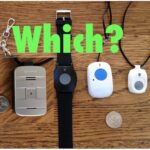By: Editorial Team | Posted: February 12, 2019 | Updated: February 13, 2025
This page contains specific medical alert recommendations for a specific type of person: one that fits a “persona” we call the “Go, Go” persona. These recommendations were updated in December 2023.
If you are not sure if this is the right persona for you, start at our Medical Alerts: Just Tell Me What to Buy page (or review all the Medical Alert Personas).
The “Go, Go: But At Risk” Persona (Persona A)
This is the person who is very active physically, and mentally alert, but has reached an age where there are significant risk factors that make events like falls or stroke either more likely, or potentially more dangerous, than in someone younger. A good example might be someone with osteoporosis who is at increased risk of suffering a hip fracture if they fall.
The person represented by this persona is generally just fine. The purpose of a medical alert system for this persona is really in case adverse events (falls, stroke, heart attack) happen.
For this persona, a big function of these systems is to alleviate the anxieties of the friends and family — who worry about the senior, and what happens to that person in between visits and phone calls. Also, often people with this persona will start to get a little nervous about “what would happen if …”, and then a medical alert system might be a useful solution to reduce those worries.
Medical Alerts for the Go, Go Persona
The big picture
For this persona, it is very likely that a “go anywhere” emergency response system (a mobile medical alert) will be more appropriate than an “at home” system, as the person is likely out and about quite a lot. If the individual likes to go off on walks alone, or otherwise is out and about by him or herself, this type of mobile medical alert system would be especially relevant. (Not sure what these terms mean? See our Tutorial: The Basics of Medical Alert Systems.)
Often, someone with this persona will care more about the aesthetics of the product than might someone with one of the more at risk personas. It will be especially important to think about a system that the person is actually likely to wear.
Finally, some of the more concierge-like features of a medical alert system might appeal to someone with this persona — who might see it as useful in more diverse circumstances (e.g. in case of a roadside emergency) rather than solely as a “medical alert”).
So, for most people with this persona, we think one of the products in the “Mobile Alerts (Go Anywhere category” or the Smartwatch as Medical Alerts category make the most sense.
We do not usually recommend a product that only works at home for people with this persona.
As always there are specific circumstances that need something different. For example, some Go, Go people tell us they really only care about using a product like this when they are at home alone. They just don’t think they need it when they are out and about. We don’t think this is the best choice for most people in this persona, but if this is how you think, then you would be better off choosing one of the many “at home only” products.
Will You Wear It?
There is a lot of discussion about which medical alert is more “perfect”. But in many ways, what matters most, especially for this persona, is whether people will actually wear the product.
With the advent in 2018 of a robust group of “smartwatches that function as medical alerts”, we think a critical decision for this persona is whether to choose a “smartwatch medical alert” or a more conventional “mobile medical alert“.
At present, we think the best of the “mobile medical alerts” are somewhat more “perfect” than the best of the smartwatch breed.
However, we think many people with this persona are much more likely to routinely wear their smartwatch, and we believe a “perfect” product that lives in your bedside drawer is less useful than a good but not perfect product that you actually wear.
So, as you look at the recommendations below, think hard about whether you will or will not wear the product. It is especially important to wear it at times like when you are in the bathroom or shower, as that is when many accidents happen.
Specific Recommendations
The Go, Go Persona has several “sub-personas”. Pick the sub-persona below that best fits you, and see what we recommend.
NOTE: We are intentionally limiting this page to “recommendations” without too much about the background or testing. If you want to see all the gory details, view the Medical Alert Reviews page for individual product reviews and some “Best of Breed” articles.
Safety Above All (Sub-Persona A4):
Safety above all. Don’t care how it looks. Don’t want a smartwatch anyway.
Some people who are shopping for medical alerts care above all that it works flawlessly as a medical alert, and don’t care how it looks. They have no problem wearing a conventional medical alert pendant at all times, even if it may sometimes appear bulky, ugly, or stigmatizing.
People who fit this sub-persona often say things like “I am beyond caring about how things look. I want it to keep me safe and that is all that matters.”
If a person fits this category, and also has no desire whatsoever to have smartwatch capabilities like step counting, or the weather on their wrist, then in our opinion they are not the right fit for any of the “smartwatch as medical alert” products. Instead they would be best served by a more conventional mobile medical alert.
UPDATE Dec.2023: There have been some changes in the mobile medical alert landscape since we wrote this page, and we have not reviewed all the new products. While we think the products below are still good, there may be newer ones that are even better.
So, we no longer recommend a “best” product in this category. See the Medical Alert Reviews page for more information about this category.
If you are not sure where to start, we like the product families offered by the vendors: Bay Alarm Medical, Medical Guardian, and Lively. Just be sure to focus on a mobile medical alert and not one of the variety that only work while you are at home.
Also, for this category of people in 2024, we think it is well worth looking at one of the simplified medical smartwatches, some of which are offered by the vendors above.
Thinks Medical Alerts are ugly. Don’t care about smartwatch features. (Sub-Persona A3):
I am very reluctant to wear a conventional medical alert at all times, and out in public. But I don’t care much about smartwatch features.
For you, there are several options to consider.
The category of medical alert we recommend for you is the Simple Smartwatches (with Fall Detection).
You can see an overview of this type of products, with links to specific reviews of individual products here:
The key is to select one of the “simple” smartwatches with not too many features, rather than the “full featured” products like the Apple Watch. And make your selection based on appearance and charging details, rather than how many smartwatch features it has.
For a more detailed comparison of this group of products (but no longer up to date), see Smartwatch as Medical Alert.
More Details
See our detailed reviews, and links to the companies’ websites (plus some discounts available only to Tech-enhanced Life readers):
Care about being stylish. Like the idea of a smartwatch (Sub-Persona A2):
I really like the idea of having some “smartwatch features” like the weather or step counting. I care about looking stylish. I am not sure I would really wear a conventional medical alert out in public.
But you worry an Apple Watch is just too complex for your tastes. And, you think a relatively bulky smartwatch would be compatible with your personal aesthetic.
In this case we think the same Simple Smartwatches described in the category above will be good for you. They have some basic smartwatch features. They are pretty easy to use. We think they are stylish. And they do not have an overwhelming array of features.
Make your selection based on which specific smartwatch features are important to you. Read the individual reviews to learn more.
The downside compared to a conventional medical alert is they are slightly more complex to use. But we think it is better to wear a product like this, than to have the “perfect” conventional medical alert that you keep at home in your bedside table because you don’t like to wear it.
Just be sure you are OK with the issues discussed in the sections on “Charging” in the individual reviews.
More Details
See our detailed reviews, and links to the companies’ websites (plus some discounts available only to Tech-enhanced Life readers):
Apple Watch Fan (Sub-Persona A1):
I already have an Apple Watch and love it. Why do I need yet another gadget to put on each day?
This one is easy. You already have an Apple Watch, and thus you presumably don’t have a problem mastering its relative complexity, reading its small screen, taking care of charging it, and such like factors. And the fact you have the product already suggests you value some of its specific smartwatch features. You may also value the statement made by having this desirable consumer gadget.
The big question for this person is whether they feel a need for a monitored solution, or are happy with the idea that when they call for help it just calls 911. The person also needs to weigh up how important an automatic fall detection algorithm is.
The choices are:
- fall monitoring algorithm, but an unmonitored service (calls 911 directly): The Apple Watch, with built-in Emergency SOS App.
OR:
- FallCall Detect fall monitoring algorithm, and a monitored service in which the alert can at your choice go either to a professional monitoring service or to members of your care circle: FallCall Lite App (on the Apple Watch).
More Details
Need A Different Persona?
Medical Alerts: Just Tell Me What to Buy!
Buying these Products
Below are links to our “review” page for each of these products, on which are a lot more details about our evaluation. The review pages also include links to the company’s websites, where you can acquire the products if you wish.
We have negotiated “discounts” with some vendors exclusively for readers of Tech-enhanced Life. See the individual reviews for details and discount codes.
*Disclosure: The research and opinions in this article are those of the author, and may or may not reflect the official views of Tech-enhanced Life.
If you use the links on this website when you buy products we write about, we may earn commissions from qualifying purchases as an Amazon Associate or other affiliate program participant. This does not affect the price you pay. We use the (modest) income to help fund our research.
In some cases, when we evaluate products and services, we ask the vendor to loan us the products we review (so we don’t need to buy them). Beyond the above, Tech-enhanced Life has no financial interest in any products or services discussed here, and this article is not sponsored by the vendor or any third party. See How we Fund our Work.

